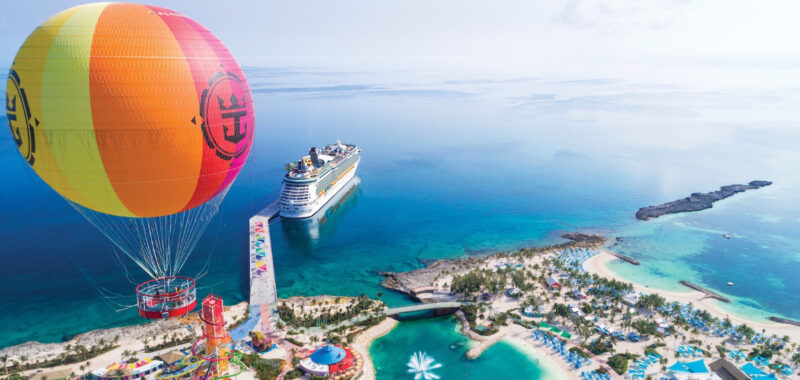Cruise operators such as Royal Caribbean and Carnival are increasingly focusing their development energies on dry land.
Where? At so-called ‘private destinations’ — exclusive seaside resorts wholly controlled by individual cruise line companies. Hundreds of millions of dollars have already been spent, with more to come.
Analyst Richard Clarke summed up the trend in a report this month for Bernstein: “By visiting only locations owned by the cruise line, cruise companies avoid concerns about whether new and bigger ships can fit into ports, whether locations will have the capacity to absorb guests, and any objections from locals about the economic impact of the cruise. It also helps sidestep any concerns that may arise from political or social instability that could endanger guests.”
So, what are private destinations exactly?
Private Destinations’ Key Elements
- Beach resorts with bars, restaurants, and outdoor leisure activities in freshwater pools as well as the sea
- Destinations where guests usually stay for around eight hours
- Close dock access or purpose-built piers where liners dock and guests return overnight
- Capacity to host millions a year
Why Are They Emerging Now?
- Overcrowding — also known as overtourism — at resorts visited by more than one cruise line
- Cruise line companies’ desire to capture more of guests’ holiday spending
- Cruise line companies’ ambitions to explore new sources of revenue and bolster yields
Royal Caribbean as Pioneer
A good example of a private destination is Perfect Day at CocoCay, Royal Caribbean International’s resort in the Bahamas, around 140 miles east of Miami. Guests can, among other things, play beachside volleyball and basketball, refresh at a floating offshore bar, or relax at one of the beachfront cabanas.
Royal Caribbean has a few other private destinations in the pipeline. One is Perfect Day Mexico, due to open in 2027.
The company is also developing its Royal Beach Club Paradise Island, due to open in 2025, while its Royal Beach Club Cozumel continues to make progress to open in 2026.
Royal Caribbean Group CEO Jason Liberty said the company’s land-based initiatives would be “incredible” and “truly game-changing for our guests.”
Carnival’s Push
Carnival Corporation, meanwhile, is investing in a $100 million pier extension for its private destination at Celebration Key on Grand Bahama, which is set to open in 2025.
“The now $600 million flagship project remains the largest of its kind ever undertaken by Carnival Corporation,” the company said.
The project’s initial phase, including the original two berths, will include 300 permanent positions for Bahamians hired directly by Carnival to help welcome 2.2 million guests a year to Grand Bahama.
Private Beaches, Too
While the term’ private destination’ most clearly applies to resorts with exclusive access, the trend encompasses smaller capacity destinations, such as exclusive beach access within larger resorts.
The common factor is letting cruise companies take more of guests’ discretionary spending.
During its third-quarter earnings call in September, Carnival discussed its expansion of Half Moon Cay — a place it says “will be enhanced to include an expanded beach, dining, and beverage experiences along with a new pier that will allow the company’s larger ships to visit.”
Government Approval
As for wider economic benefits, Carnival cites a study by Tourism Economics, an Oxford Economics company, indicating that over the next two decades, Celebration Key will create more than 2,500 direct Bahamian jobs, generate $3.2 billion in incremental revenue for the Bahamanian government, and contribute $9.7 billion in incremental economic impact to the Bahamas GDP.
For its part, Norwegian Cruise Line has Harvest Caye, a 30-square-kilometer resort in southern Belize. The private destination is owned in partnership with the Belizean government.
Disney Cruise Line has Castaway Cay in the Bahamas.
Private destinations are a logical extension rather than a completely new type of business, as cruise lines have visited ports of call forever. Yet running private destinations is new, and proper execution is critical. While holiday experiences at sea are not wildly different from onshore vacations, the mechanics will require different expertise to handle particular operational and financial risks, such as exposure to extreme weather.

